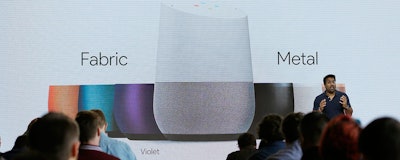
When Amazon unveiled its first smart speaker, the Amazon Echo, in the fall of 2014, the initial reaction from many people was: “why on earth would I voluntarily put a device in my house that allows Amazon to listen to everything that’s going on?”
In response to this (not surprising) reaction, Amazon repeatedly pointed out that the device only starts listening once the code word has woken it up and thankfully that appears to be true. The worst thing that could have happened to Amazon from a PR perspective at that time was for people to discover that the Echo listens in on its users without having been activated. It did not and the device became a runaway success.
For Google, having recently extended its own line of smart speakers, that PR nightmare became reality this week, when a reviewer of the new Google Home Mini discovered that the device was recordingconversations without having been prompted to do so. Google quickly issued a statement explaining that a faulty button had wrongfully activated the device and that this button would now be disabled on all devices via a software update. Despite the quick response, many people will see this episode as evidence that smart speakers shouldn’t be trusted, because it confirms one of the most cited concerns with respect to smart speakers as our chart, based on NPR and Edison Research data, illustrates.























